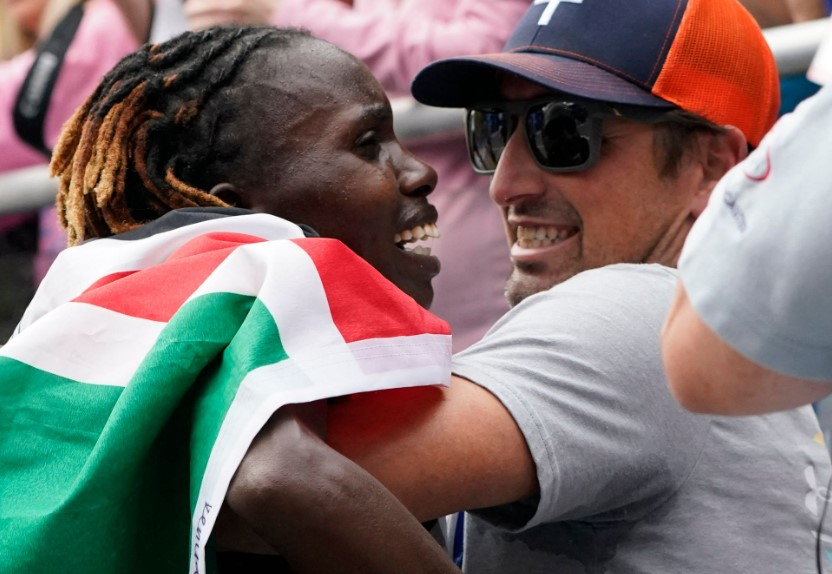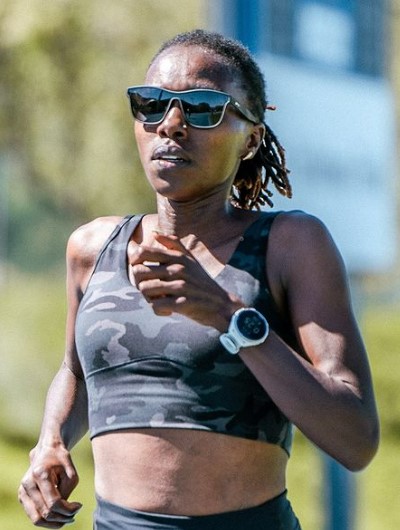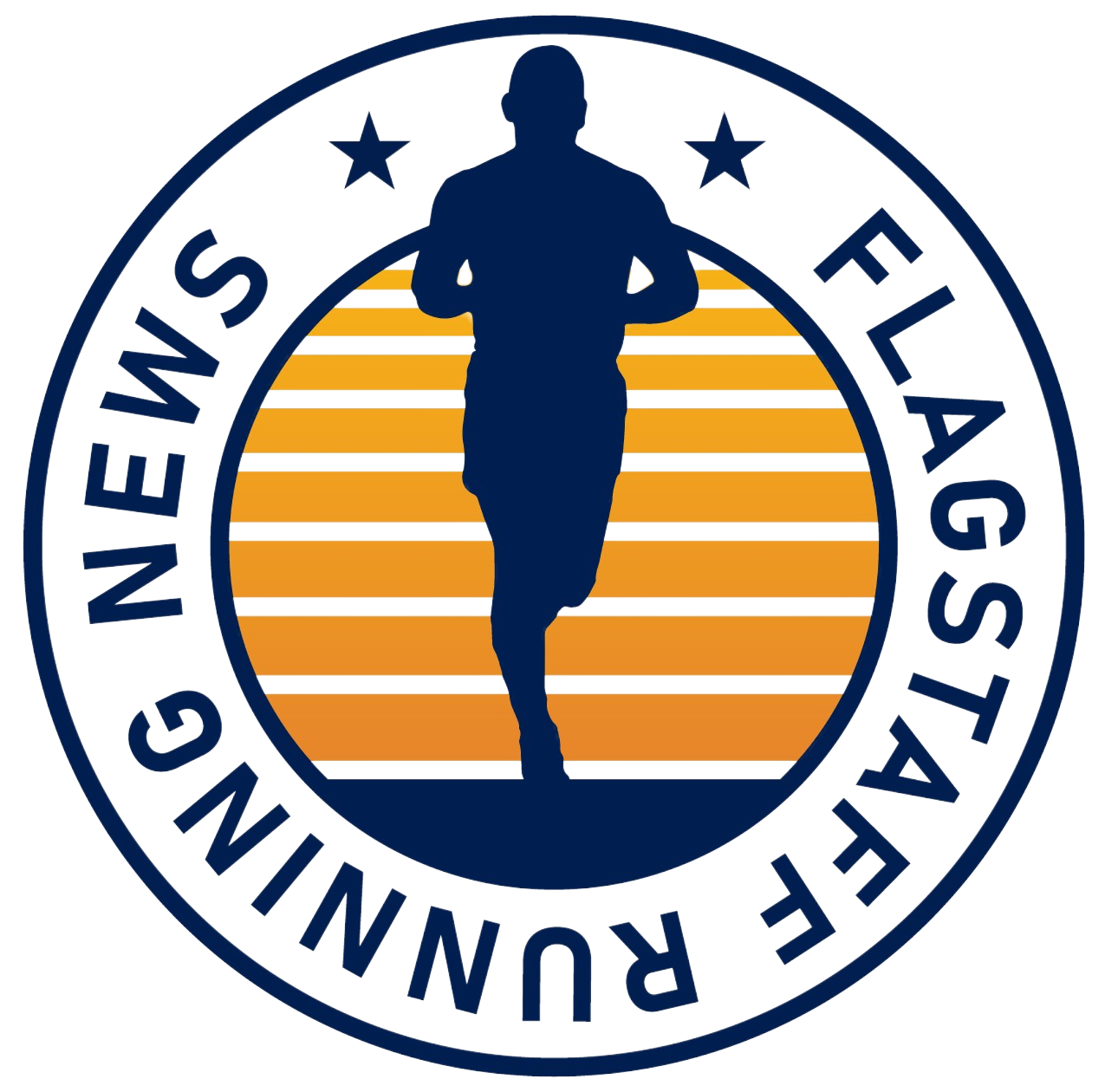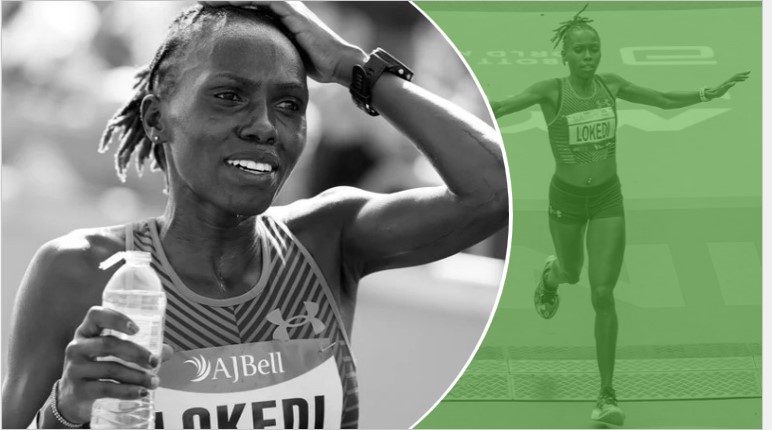Sharon Lokedi really does like Flagstaff, OK? It’s not that. Not at all. Truth is, circumstances just conspired so that, for all four of her previous marathon build-ups — including her stunning 2022 New York City debut victory and last summer’s fourth-place Olympic finish – Lokedi did the bulk of her training in her native Kenya and not her adopted home of Flagstaff.
Always, though, Lokedi comes back to our mountain town, where she trains with the Under Armour Dark Sky Distance team. She’s here now, in fact, but this time plans to stay and do all her prep for this Sunday’s New York City marathon on the trails and roads of the greater Flagstaff area.
Coaches and pundits always say, don’t change something that’s worked for you in the past. Given that, some may question why Lokedi, 30, is changing her build-up now, when her first four races have been wildly successful – one of the best starts to a marathon career this side of Sifan Hassan or Hellen Obiri.
Four races, three podium finishes. There was that debut victory in New York, followed by a third-place finish in the same race a year later, followed by a close second in last April’s Boston Marathon. And, though it might not reflect it in placing, her performance in the Paris Olympics last month might have been her most impressive, given the circumstances. Lokedi was called by Athletics Kenya a month before the race and asked to fill in, the result of which was her hanging with the lead pack right up to the final kilometer before finishing fourth.
So, again, why not return to Kenya for prep for Marathon No. 5?
“Yeah, it’s pretty different,” she said, amid the lunchtime bustle at a Flagstaff café, “but I like it. It’s been about two weeks, and it’s gone great so far. I’m really excited.”
In the past, Lokedi has done the first few weeks of marathon training in Flagstaff, before doing the heavy mileage in Kenya, where, as with Flagstaff, she has a home close to a popular marathon training center. She says she doesn’t prefer the Rift Valley over the Colorado Plateau; it’s just the way things turned out before.
“Initially (in 2022), when I was ready to do my first marathon, I just thought, ‘Well, I’m already here (in Kenya), so I’ll just stay and get used to marathon running,’” she recalled. “It got to the point where, ‘OK, it is working (in Kenya), so let’s just keep it at that.’ Now, I’m trying to see how this will go.”
For her much-abbreviated Olympic prep over the summer, Lokedi didn’t have much choice. She assumed she wasn’t going to Paris, since she was only picked as an alternate to the Kenyan team and was preparing for the BAA 10K after placing second in the New York Mini 10K on June 8.
Plans changed suddenly, though, on July 10. Kenyan officials announced that Brigid Kosgei was injured and could not compete. Lokedi got the call and started a frenetic mini prep in Kenya for the Olympics in less than a month.
“It was crazy,” Lokedi said of the abrupt change in her schedule. “I’m like, ‘What?’”
Accepting the disappointment of not initially being selected for Kenya’s marathon team, she and Dark Sky coach Stephen Haas decided to focus on road 10Ks and do a long, gradual build for November’s NYC marathon. Then, everything changed, and Lokedi had a month to get in some high mileage and good workouts before toeing the line with the likes of Hassan, Obiri and Ethiopian Tigst Assefa, the world record holder.

But Lokedi is nothing if not a competitor, and she heretofore has shown almost preternatural ability at the marathon distance. Still, filling in on such short notice was a big ask. But Lokedi surprised many by contending most of the way, taking fourth in 2:23:14 in the heat on a hilly course.
Did she feel adequately prepared for the Olympics?
“No, not really,” she said, smiling. “For my other marathons, I’ve had two to three months of real training. I had to change everything with a month to go. You have to, you know, increase. Workouts were ramping up all of a sudden. I went from 70 miles (a week) to 100 miles and more. It was insane. I had to find a way to get it all in. I was just like, ‘Oh my gosh, mentally, I don’t know if I can take all this.’ But I had really good support back there (in Kenya). There were a few people there I could train with, too. I surprised myself every time, like, I’d do workouts and think, that’s me?
“I’m a person that, if I put my mind to something, I really, really focus on it. All my focus went into the Olympics. I didn’t get enough training and enough mileage, but what I had worked.”
So now, instead of that long, steady NYC build that she and Haas imagined, Lokedi had to start her New York build after only a week or so of rest and recovery back home in Kenya.
After that, it was back to work and … back to Flagstaff?
It makes sense, in a way, since the race is in the United States, albeit two time zones away. But Lokedi said she’s fine with mixing things up. She said she’s trained well wherever she runs, be in near her home village of Burnt Forest at 7,900 feet among the Kalenjin tribe, or at 800 feet in Lawrence, Kansas, where she won an NCAA 10,000 meters title at the University of Kansas, or at 7,000 feet on Lake Mary Road in Flagstaff.
Her interviewer asked her, half-jokingly, that, if she doesn’t have a good race in New York, might we never see her in Flagstaff again? Lokedi squinted and then laughed.
“Oh, gosh, I hope not, I like it here,” she said.
It seems Lokedi is comfortable wherever she trains and in whatever race she’s contesting. She may outwardly come off as a little shy, but she possesses exceptional confidence and self-assurance. And she’s certainly backed it up with results. In four years as a pro with Dark Sky, she’s had only one injury, a tibial tendon issue that kept her out of the Boston Marathon in 2023.

Other than that, she’s adapted to the marathon distance without a hitch and with impressive alacrity. Few women in their 20s who are based in America end up winning their debut marathon (Fiona O’Keeffe at the 2024 U.S. Olympic Trials is an exception) but Lokedi did just that in 2022 on the streets of Manhattan.
“It was my first marathon, I just wanted to get it done and over with,” she recalled. “If I could get top five, great. Then that happened. (In Central Park, near the race’s end) I kept looking, ‘Is it really just me here?’ It gave me so much confidence. That race made me believe in myself. Every race now, I’m like, I can do this.”
There was, Lokedi admits, a little bit of doubt in her mind lining up in Paris.
“I kept looking around,” she said, smiling, “and I look on this side, ‘Oh, she’s run 2:11.’ I look the other side, ‘She’s run 2:13.’ Then the other girl next to me has run 2:18. I thought, ‘Well, I’m here with them.’ But, actually, it gives me so much confidence knowing that I can stay with them for that long.
“I really did think it could be anyone’s race. I’m proud of the women who’ve done so well and done amazing work, but I think, ‘It can be me, too.’ I try to put myself in there every time and say, ‘It’s a new day, go out and compete.’ My attitude is, keep fighting as long as you can.”
If there is a question about Lokedi and the marathon, it is this: How would she do on a flat, fast course with pacers – such as in Berlin or London?
After all, all of her four marathons have been on hilly courses – New York, Boston and Paris — that favor pure racers over time-trialists. Hence, Lokedi’s time are slower than many elites. Her P.R. is 2:22:45 in Boston, hilly but a net downhill. In 2022, she won New York, another rolling course (and record-eligible) in 2:23:23.
Considering that Assefa’s world record, set last year in Berlin is 2:11:53, Lokedi’s times may seem slow. But Berlin has only 241 feet of elevation gain. And, when the two raced head-to-head this summer at the Olympics, Lokedi finished two places and 16 seconds behind Assefa.
Lokedi acknowledges that some might doubt her speed, but she believes she, too, could thrive in a paced race on an easy course. In fact, she said, after New York in November, her next race most likely will be just that – fast and flat.
“I think about it all the time,” Lokedi said, referring to running a fast marathon course with pacers. “Haas and I go back and forth. Do we want to do a fast marathon now or not? After New York in 2022, I got injured. And I didn’t do anything. I ran only one race last year (2023) in New York. After that, we thought, ‘OK, go to Boston and then we’ll think about another faster marathon (in the fall). But then Olympics came in, and then now there’s New York again.
“Hopefully, next year or the year after, that’ll be the big focus.”
Would Lokedi have to train differently for, say, Berlin or London?
“I think I’d train the same, maybe if anything, add a little more speed (work),” she said. “My mileage varies. These last two buildups have been shorter, so the mileage is less than previously. The highest I went was during Boston build-up, 127 (miles average), and I think the highest was 141. I can handle it, my body can. The thing is, my long runs are not all hard. So if I have a 25-mile (long run) this week, I’ll have 20 the next. Up and down weeks. That helps.”
Though the pace obviously would be faster on a flat course, Lokedi believes her race instincts she showed in her four previous marathons will help her.
“I think I’m a good racer,” she said. “This comes from college. My college coach used to tell me that. He used to have my teammates start before me (in practice) and then I’d kind of chase them. That has helped me in setting a target and getting to that goal. So every time I have someone in front of me, I think, ‘I have to get to that person.’ I think it’s helped.”
Lokedi paused after that answer, then added almost apologetically: “I think maybe I believe in myself too much. Maybe not. Yeah, I work hard in my training. I do everything possible. I have to put in the work, because it doesn’t come easy for me.”
There was a time, just after turning pro with Dark Sky, that Lokedi wasn’t brimming with confidence. Though she came out of college with an NCAA title, several professional running groups and shoe companies didn’t show much interest. Haas, who not only coaches Dark Sky but is a high-profile agent, worked out an agreement with Under Armour.
Though she won her first pro race, the 2019 Carlsbad 5,000 in 15:48, Lokedi didn’t exactly set the track and road-race world on fire. She had decent, promising results, but not eye-popping.
Until November of 2022 in New York.
“Yeah, before New York, I thought I was at a point where I was, you know, average,” she said. “But that was my breakthrough run. I had been with Under Armour and after that they were like, ‘Oh, we want to make the deal longer.’ They extended my contract, and I was happy with that.”
It was disappointing but not surprising, she said, that she wasn’t more heavily courted by pro teams after college.
“For us, for internationals, it’s hard to get attention (in America),” she said. “Even if you win an NCAA title, it is still hard for us to get a contract. I had an NCAA title and thought I’d have more offers. But it was interesting to see it not happening. I finished college and then won my first race professionally (Carlsbad) and you’d think that would’ve helped. But no, it wasn’t enough.”
Safe to say Lokedi has people’s attention these days. She can, basically, pick which marathons to run, and where to train.
And for this go-round, it’s Flagstaff, where she has a home much bigger, she said, than her “studio apartment” in Kenya.
She said there are advantages and disadvantages to each locale.
“In Kenya, my home is 5 minutes away from training,” she said. “Where I live there, it’s very small. Bed, kitchen. One room. I get up in the morning, I go train. I meet up with people and run, then come back, sleep, get up again and go back to train. There’s a convenience there. It’s also a big group, so that helps, and most of us (training in Kenya) are marathon runners. You have people to push you.”
Also, her family is there. So is her husband, Team Kiprun elite Edward Cheserek, who also splits time between Kenya and Flagstaff. But Lokedi said that, as in Flagstaff, she isn’t always recognized as a world-class runner. Which is a plus, she said.
“That’s the thing about Kenya, everybody’s good (as runners) and they treat you just like everybody else,” Lokedi said. “And I really like that. The coach treats everybody the same. It’s very humbling, very, very humbling.”
In Flagstaff, though, she said she has access to all of Dark Sky’s strength training facilities, as well as massage therapists and medical personnel. One downside: She’s the only Dark Sky female marathoner.
“I’m used to having pacemakers, but I’ve been doing most of the workouts here (recently) by myself,” she said. “I have Noble (Dark Sky assistant Boutin) with me on the bike and Haas is coming back (from Europe) next week, and (assistant coach) Pat Casey is here, too. They’ve been really good. One’s on the bike; the other is driving.
“It’s always been the plan to do the (build-up) here (in Flagstaff) this time. We’re still looking for more workout partners. If I can get more pacemakers, it’d be great.”
Last week, for instance, Lokedi did her long run at the A-1 Mountain forest roads, though instead of doing only the 20-mile lollipop loop around Wing Mountain, she veered off to Bellemont for a while to make it 25 miles. She did it at about six-minute pace.
“Not too bad,” she said, matter-of-factly. “It was my first big one (this build-up), and I tried not to go out too fast.”
Might teammate Weini Kelati, a U.S. Olympian in the 10,000 meters, move up to the marathon soon and become a marathon training partner?
“I think that’s probably two years from now,” Lokedi said. “But I’m excited to show her the ropes of marathon running.”
Nearing her fifth marathon, Lokedi believes she has enough experience to deal with whatever is thrown at her during a race. She’ll have plenty of competition in New York, with Obiri returning, as well as fellow Kenyans Vivian Cheruiyot and Sheila Chepkirui and Ethiopia’s Tirunesh Dibaba.
“I never count anyone out, and this is a strong field, so you never know,” Lokedi said. “But I don’t count myself out, either.”


Leave a Reply